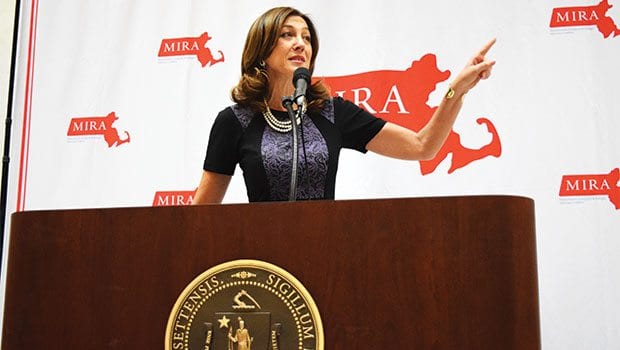Immigrant advocates lobby at State House for policies
Safe Communities Act is a key priority for protecting immigrants, constituents say

On the 22nd annual Immigrants’ Day last Wednesday, April 4, hundreds of Massachusetts constituents converged at the State House to lobby for policies that better protect both undocumented and documented immigrants.
The day’s action has become even more critical at a time when the Trump Administration recently announced its intention to restore a citizenship question in the upcoming 2020 U.S. Census.
The policies residents are advocating for include the Safe Communities Act; increased funding for English language classes for adults; services for immigrant survivors of domestic violence and sexual assault; and citizenship pathways for green card holders, Temporary Protected Status holders, and Deferred Action for Childhood Arrivals recipients.
The event, hosted by the Massachusetts Immigrant and Refugee Advocacy Coalition, coincided with the 50th anniversary of Martin Luther King Jr.’s assassination.
Members of the movement addressed the crowd in the State House Hall of Flags during the event’s speaking program.
“On this day, I am reminded that this immigrants’ movement has its roots in the ongoing civil rights movement,” said Alejandra St. Guillen, director of Mayor Martin Walsh’s Office of Immigrant Advancement.
“On this day, I remind you, that the State House belongs to you, as much as it belongs to anyone else in the Commonwealth and that your legislators represent everyone in their district, regardless of immigration status,” she said.
Civic engagement
Eva Millona, executive director of the MIRA Coalition, emphasized the need for legislators to pass the Safe Communities Act which would prohibit local law enforcement from making inquiries about immigration status or, collaborating with Immigration Customs Enforcement and require basic due process protections to undocumented immigrants in police custody.
“I urge the legislator, please don’t let this linger anymore,” said Millona. “[The bill] draws clear lines between immigration and public safety to ensure due process for all.”
Millona said that the state of immigrant advancement in Massachusetts was not all bad news; she commended the passing of An Act Relative to Language Opportunity for Our Kids, (LOOK) which reversed a prior mandate that required schools to use Sheltered English Immersion as the only learning model.
“I’m also optimistic that before the session is over, we’ll pass legislation that will train and help health professionals overcome barriers to licensing so we can employ them in underserved areas in our Commonwealth,” she said.
Andrea Campbell, Boston city council president, also spoke at the event.
“Thank you for lending your voice and time to advocate,” she said. “It takes tremendous amount of courage to show up and ask what you need from your government and to demand it.”
Campbell said her district, which comprises Dorchester, Mattapan, and parts of Roslindale and Jamaica Plain, is one of the most diverse in Boston and includes a fast-growing Latino population. However, it is also one of the lowest voter turnout districts in the city.
She said, “That tells me that most residents feel like government is not a place for them or that their voices do not matter. I don’t blame them, I understand. I’m here to tell them, your voices do matter.”
Economic power
Maria Martin Goula, ESL teacher at East Boston Ecumenical Community Council, was at the State House on Immigrants’ Day with a group of 17 ESL students who were lobbying for the first time ever.
“Our people have never done this action before and it was important for us to talk to someone who is very supportive, people who are on our side, to break the fears they have of going to public legislators,” said Martin Goula after she and her group met with Rep. Adrian Madaro.
According to numbers provided by MIRA Coalition from the Partnership for a New American Economy, one in five workers in Massachusetts was born in another country.
Additionally, immigrants and refugees in the state have more than $31 billion in spending power every year, earn $42.9 billion a year and pay $8.4 billion and $3.5 billion in federal and state taxes.
Plus, 68,700 of the state’s entrepreneurs are foreign-born and employ over 134,000 people and generate $1.9 billion in business revenue.






